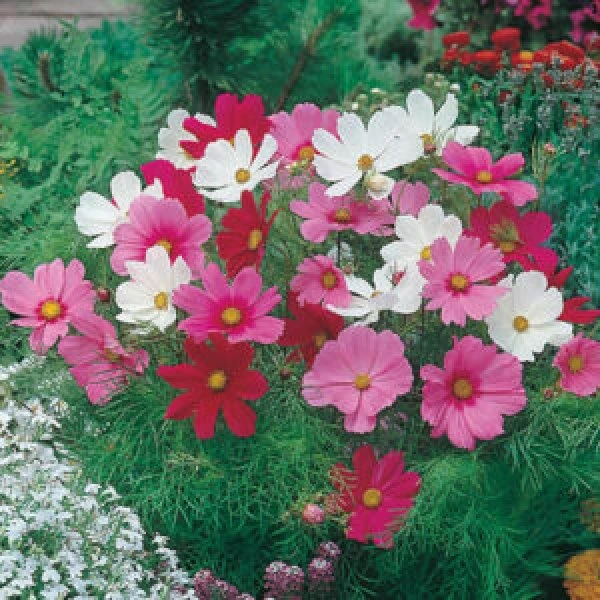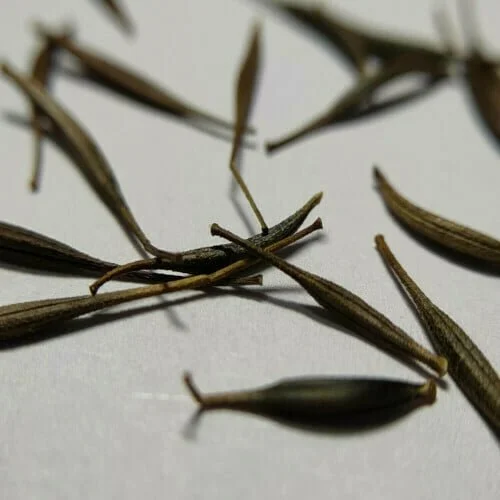Cosmos Mixed Sensation Seeds (20 seeds)
₹20.0
Cosmos have big beautiful daisy-like flowers. They are easy to grow and they are a great addition to any garden that attracts bees and butterflies in summer. Grow them in your borders, in a cutting patch, and even in pots. Try our Non-GMO Cosmos Mixed Sensation Seeds. Also, check out our workshops for more details.
PRODUCT DESCRIPTION
Number of seeds in a packet – 10
PLANT DESCRIPTION
- Difficulty Level – easy
- Plant Height – up to 6 feet
- Flower Color – mixed
- Type – outdoor
- Feed – Vermicompost for nutrients every week, Seaweed once a month for greener leaves, and Epsom salt for better blooming once a month
- Watering – 1 – 2 times a week
- Sunlight – moderate sunlight
- Germination Time – 1 week
- Flowering Time – 9 weeks
- Suitable Temperature – 60°F – 70°F
- Season – annual
- Sowing – may – june
HOW TO GROW COSMOS MIXED SENSATION FROM SEEDS
- Take a Seedling Tray and fill it with Cocopeat.
- Make a hole double the size of the seed.
- Fill the hole with Cocopeat and spray with water using a spray gun or spray bottle.
- Keep the soil moist not soggy.
- Seeds will germinate within a week.
- Re-pot the sapling to a Medium Size Pot in about 2 weeks.
- Moderate sunlight is needed.
ALTERNATE METHOD
- Take a Medium Size Pot and add a Potting Mix.
- If planting in the soil adds Neem Cake Powder, Vermicompost, and Seaweed.
ALTERNATE NAME
Botanical name: Cosmos bipinnatus
cosmos mixed sensation seed in hindi: brahmaand mishrit sanvedana beej (ब्रह्मांड मिश्रित संवेदना बीज)
cosmos mixed sensation seed in tamil: pirapancam kalanta unarvu vitai (பிரபஞ்சம் கலந்த உணர்வு விதை)
cosmos mixed sensation seed in telugu: kasmos miksd sensesan sid (కాస్మోస్ మిక్స్డ్ సెన్సేషన్ సీడ్)
cosmos mixed sensation seed in kannada: kasmos misra sanvedane bija (ಕಾಸ್ಮೊಸ್ ಮಿಶ್ರ ಸಂವೇದನೆ ಬೀಜ)
cosmos mixed sensation seed in marathi: kosamosa misrita sanvedana bija (कॉसमॉस मिश्रित संवेदना बीज)
cosmos mixed sensation seed in malayalam: kosmos mixed sensation vithu (കോസ്മോസ് മിക്സഡ് സെൻസേഷൻ വിത്ത്)
Other names: Mexican aster, garden cosmos..
You must be logged in to post a review.
Q & A
Organic flower seeds, like any other organic products, are generally considered more sustainable compared to conventional counterparts. Here are some reasons why organic flower seeds contribute to sustainability:
Environmental Benefits: Organic farming practices for flower seed production focus on maintaining soil health, biodiversity, and ecological balance. These methods promote the use of natural fertilizers, such as compost and manure, while avoiding synthetic pesticides and genetically modified organisms (GMOs). By avoiding the use of harmful chemicals, organic flower seed production minimizes soil and water pollution, protects wildlife, and promotes a healthier ecosystem.
Soil Conservation: Organic farming techniques emphasize building and preserving soil fertility. Crop rotation, cover cropping, and the use of organic amendments help improve soil structure, enhance water retention, and reduce erosion. Healthy soil ecosystems foster nutrient cycling and reduce the need for synthetic fertilizers, making organic flower seed production more sustainable in the long run.
Genetic Diversity: Organic flower seed production encourages the preservation and promotion of heirloom and open-pollinated varieties. These seeds possess genetic diversity and adaptability, which helps maintain resilience in the face of environmental challenges, pests, and diseases. By cultivating and saving organic flower seeds, farmers and gardeners contribute to the preservation of plant biodiversity.
Human Health: Organic flower seeds are grown without the use of synthetic pesticides, herbicides, or fungicides, reducing exposure to potentially harmful chemicals. This benefits not only farmers but also consumers, who may come into contact with these products. Organic flower seeds are free from genetically modified organisms, ensuring that they align with consumers' preferences for non-GMO products.
Sustainable Farming Practices: Organic flower seed production often promotes sustainable agricultural practices, such as water conservation, energy efficiency, and waste reduction. These practices minimize the environmental footprint of the overall seed production process, making it more sustainable.
It's important to note that the sustainability of organic flower seeds also depends on factors such as transportation, packaging, and the overall supply chain. Local sourcing, minimal packaging, and reduced carbon emissions in distribution further enhance the sustainability of organic flower seed production.
By supporting organic flower seed producers and practicing organic gardening methods, individuals can contribute to a more sustainable and environmentally friendly approach to growing flowers.
General Inquiries
There are no inquiries yet.




Reviews
There are no reviews yet.